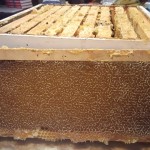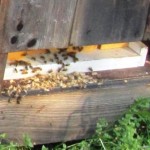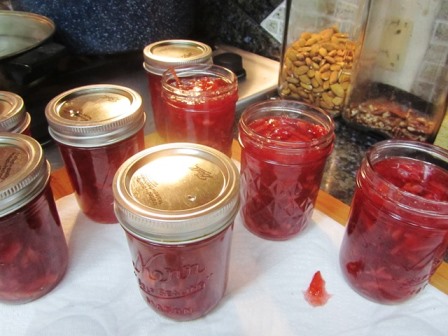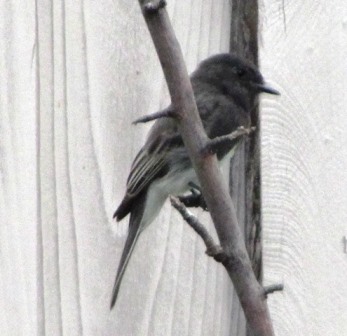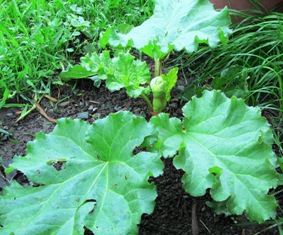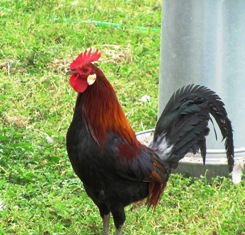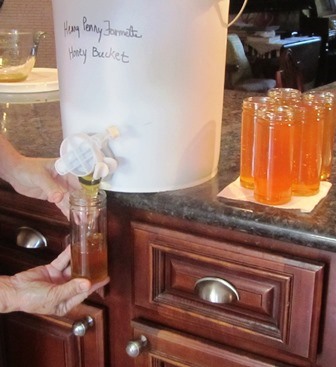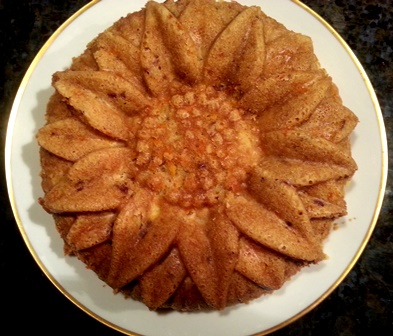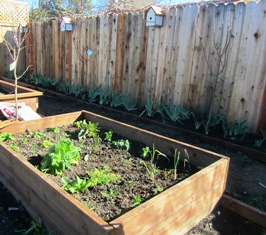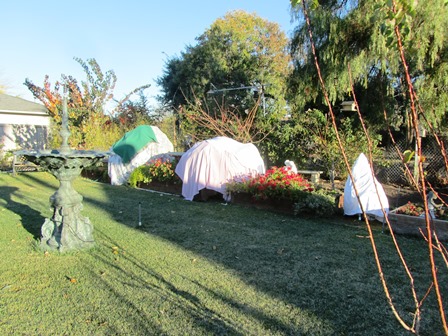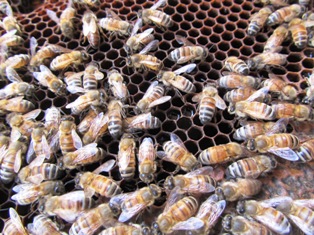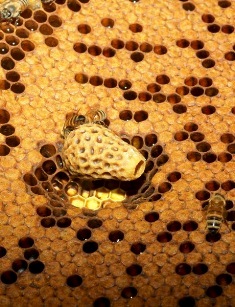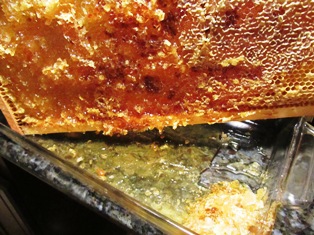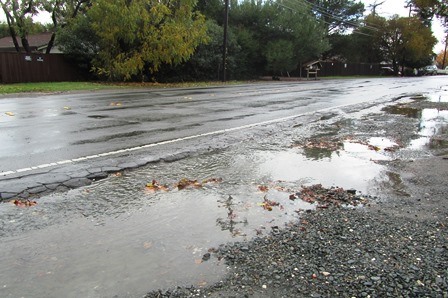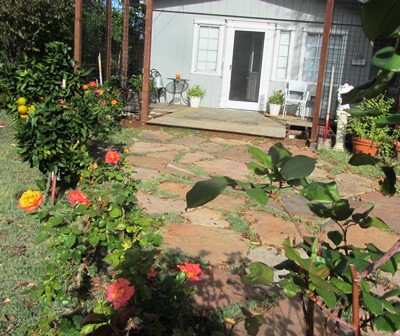De-Bugging My Honeybee Hive Box of Beetles
I’ve been dealing with a beetle problem in my honeybee hive since fall. When my knowledgeable beekeeper neighbor called to suggest opening the hive, I readily agreed.
The dreaded hive beetle–tinier than a honeybee–can destroy a hive. Its destruction isn’t on the bees themselves, but rather the comb, honey, and pollen. As the population of hive beetle increases and the destruction mounts, the bees will abandon the hive.
Previously, my neighbor had used two types of hive beetle traps in my hive–Beetle Bee-Gone was an all-natural, chemical-free sheet that looked like a fabric softener product for the dryer. We had placed this on top of the frames before closing the hive last fall. The other product was a narrow plastic tray inserted between the frames that held vegetable oil.
We discovered that the sheet worked well, trapping lots of hive beetles. But the frame with oil had no beetles. I dumped it. We checked the brood box–and were excited to see it full of unborn babies.
After harvesting eight frames of honey, we reversed the brood box, scraped away the burr comb, and positioned a super on top of the hive box with empty frames for spring honey. Before closing the hive, we inserted two clean sheets of Beetle Bee-Gone.
Today, the bees are active and out foraging for pollen. Flowers are everywhere and the fruit trees in the neighborhood have broken bud. It remains to be seen if the Bay Area gets any more rain or bitterly cold days ahead. Probably by April 1, I’ll hang the swarm catcher and hope to add a new population of bees to my colony.
______________________________________________________________________________
If you enjoy reading about keeping bees, growing heirloom vegetables and fruits, caring for chickens, or self care for healthy living, check out my Henny Penny Farmette series of cozy mysteries: A BEELINE TO MURDER, THE MURDER OF A QUEEN BEE, and HIVE OF HOMICIDES. Click on the URL below. Also see newest nonfiction for healthy living: RITUALS FOR LIFE.
http://tinyurl.com/ya5vhhpm
The Quiet Beauty of a Winter Garden
There is a quiet beauty in a winter garden. You must endure cold to appreciate it. On my farmette, there’s also fog and wind and misty rain. But as you gaze in mindfulness, the rewards come.
When trees are bare, you can appreciate the beauty of their scaffolding, branching habits, and fruiting spurs. There is an attractiveness about tree bark that is rough or smooth and colored in earthy hues of green, gray, or reddish brown. Bare trunks and branches provide visual interest until blossoms and blooms break in spring.
With pruning done and leaves removed, the roses rest. Birds gather at feeders and frolic in the fountains. Beneath the soft, damp earth, roots are taking in nutrients to prepare the fruit trees for a surge of growth when warmer days arrive.
The garden is a place to conjure memories and ponder life and destiny. Goethe, the German playwright, poet, and novelist wrote that “Sometimes our fate resembles a fruit tree in winter. Who would think that those branches would turn green again and blossom, but we hope it, we know it.”
Winter is the perfect time to contemplate the tap root of your being and to think and and dream and plan for what will blossom in your life when warmth and light returns. French philosopher and author Alfred Camus wrote, “In the depths of winter, I finally learned that within me there lay an invincible summer.”
I have a simple ritual of visiting my winter garden. I prepare a cup of hot water with juice of half a lemon and a tablespoon of honey or sometimes just a cup of coffee or tea. Then with cup in hand, off I go to inspect the fruit trees, the bare grape and berry vines, and the soil turned in raised boxes waiting to receive kitchen herbs. This ritual inspires me and silently powers me up with hope and energy.
Perhaps you have a similar winter ritual. If not, consider checking out my newest nonfiction book, RITUALS FOR LIFE and plant something in the earth or the garden of your psyche that holds the promise of bearing fruit in its own perfect time. Now is the time to greet each new winter day for the blessings it brings and appreciate the stark beauty of Nature.

More than 150 rituals for sound mind, strong body, and meaningful connections to the people around you
20 Things to Do on a Farm When It’s Raining
Rain . . . unrelenting rain makes working outside near impossible. Since rain is in the forecast for the rest of this week, I’m doing indoor projects here on the Henny Penny Farmette. Why? Because let’s face it: try driving screws into wet fence boards or digging when the earth is like a giant mud ball, or pruning trees when looking upward against a downpour is rather ridiculous. Here are some things to do inside until the weather clears up.
1. Clean the clutter from the kitchen and test some new recipes
2. Read seed catalogs
3. Order beekeeping supplies (to be ready when the weather turns warm and the bees get active)
4. Make a batch of blood orange marmalade (since blood oranges are ripe now)
5. Feed bees, birds, and other wildlife
6. Work on indoor renovation such as finish the installation of base boards and crown moldings
7. Sew curtains; make a quilt, or start an embroidery or knitting project
8. Start the spring cleaning in one or more indoor rooms
9. Plan the spring vegetable garden on paper with a drawing
10. Clean out closets and recycle unused items from cupboards and drawers
11.Make herbal teas (for example: dried leaves of herbs such as mint, dried lemon or orange peel, spices, rose hips, and dried berries)
12. Catch up on your reading for pleasure or books and periodicals about farm and homesteading topics
13. Bring your beekeeping or gardening journal up to date
14. Order supplies–antibiotics for the chickens or medicines for your bees and other domestic stock
15. Bottle honey from the bucket and affix labels
16. Make a dazzling dessert
17. Mend clothing
18. Start working on the taxes for the upcoming season
19. Play your fiddle, piano, horn, or drum
20. Start heirloom seed in flats or get some sprouts growing in a jar
* * *
If you enjoy reading about farming topics, check out my cozy mystery series from Kensington: A Beeline to Murder, The Murder of a Queen Bee, and A Hive of Homicides. Delicious recipes, farm lore, and tips for keeping chickens and bees add to the charm of these delightful mysteries.

- COMING September 2017
- These books are available through online retailers and traditional bookstores everywhere.
See, http://tinyurl.com/hxy3s8q
A Beeline to Murder is the debut novel that launched the Henny Penny Farmette series of mysteries.
See, http://tinyurl.com/h4kou4g
The second cozy mystery in the Henny Penny Farmette series is garnering great reviews from readers and industry publications.
Rainy Day Projects on the Farmette
I awoke in the pre-dawn hours to the sound of soft pattering of rain beyond my bedroom window. The birds twittered away in the pepper tree . I rolled over to listen and said a prayer of thanks that the “storm door” has finally opened. Three storms are expected to hit our drought-stricken California during this first full week of 2016.
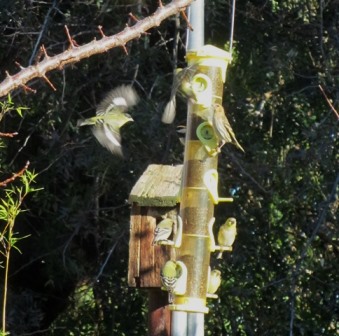
There’s always plenty of action at the feeder when the finches discover it has been filled with Nyjer seed–high in calories and oil content.
After I had swallowed a half cup of morning coffee, I headed out to the feed store to buy chicken crumble, scratch grains, and some seed and suet to hang for the birds.
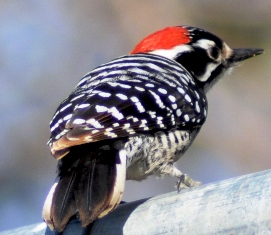
A male Nuttall’s Woodpecker loves dining on the suet cake; he hangs around all year near our pepper tree.
I won’t continue the pruning of the pomegranates and apricots that I started on Sunday. I’ll wait until we have a dry day for that. But I will continue to apply the plaster to the drywall that we’ve hung in the as-yet-unfinished small bedroom destined to become my office. That will be a perfect rainy day activity. And when I finish, I’ll go back to work on my newest mystery.
For more vignettes of farmette life, check out A Beeline to Murder, the first novel in the Henny Penny Farmette series of cozy mysteries. It’s available online and from brick-and-mortar bookstores everywhere. See, http://tinyurl.com/p8d6owd
A Prowling Raccoon Looking for a Warm Chicken Dinner
My farmette looks like some kind of ghostly haunt after sunset. That’s because of all the bed linen I’ve draped over citrus trees and frost-sensitive plants. On moonless nights, the backyard looks like a gathering of ghosts illuminated by the warming lamp in hanging in the hen house.
That heat lamp splays light across the back of the property. I didn’t realize right away that the claw marks in the dirt near the chicken run are from a large raccoon who, thanks to the light, now knows exactly where to find the chickens and has come prowling over the last few nights. My locks and the buried wire fencing of the chicken run are keeping the hens safe.
For the last few mornings, the water in the Italian fountain (the motor is turned off now) has been frozen and doesn’t thaw until mid-morning. Still, I see wild birds bathing in it. And we have plenty of wild birds now, thanks to twenty pounds of bird seed we’ve poured into feeders around the property.
I’m looking forward to the weather changing again in a couple of days–rain is on the way. The last storm brought a new blooms to the roses and caused the daffodils and some summer tulips to push up green shoots.
Since some of my trees perform better with a good winter chilling, I feel obliged to appreciate the cold. Besides, I can stay inside and bake, read books and seed catalogs, and write on my third cozy mystery novel.
If you enjoy reading about farmette life, you might like the farmette milieu featured in A Beeline to Murder, the first book in my Henny Penny Farmette series of cozy mysteries. See, http://tinyurl.com/p8d6owd
Time to Open the Hives, Check on the Bees
My honeybees have become surprisingly active for the dead of winter. Local forecasters tell us that the Bay Area temperatures may reach 80 degrees Fahrenheit by the end of the week. My apple and early peaches won’t wait; they’ve already blossomed.
The warm weather, time of year together with the fact that almond trees will be blooming in a couple of weeks and the lavender around my farmette is already blooming tells me I have to open the hives. My beekeeper neighbor says that his bees are already out collecting pollen–lots of it–and that means we have to get to work.
The hives have to be checked now for mold (that long period of hard rain in December caused some of my neighbor’s frames to mold). Moldy frames can’t be renewed; they have to be tossed. Honeybees can get nosema (with diarrhea), which shows up as spots at the base of the hive.
The bees are finding flowers on their forage runs and are returning to the hive laden with pollen.
Bee queens will be busy laying eggs in the coming weeks, if they aren’t already. This is the time for beekeepers to purchase new queens. By the first week in April, it’s possible we could see swarming.
So here’s the plan. If the hives have a lot of honey, I’ll harvest some. Strange to be doing that in winter, but the hive will need space for brood. I’ll have to remove frames of honey and insert empty frames with wax (put in the freezer first for a period to kill any pest they might be harboring over).
I’ll put bee food patties in the open hives, so they’ll have plenty to eat (once I take some of their honey). My beekeeper neighbor tells me this will get the hive “heated up” for the queen to do what she does best–lay the eggs.
With so much activity, I’m confident that everything will turn out well, but you never know until you’ve inspected the interior of the hive and checked out everything, including the possibility of mold or the presence of pests or illness.
Mother Nature didn’t ask me, but I would have preferred she wait another month before removing her winter robes and dressing in spring florals. It just seems like now everything to do with the hives is on fast forward!
Rain, Russian Poetry, Rugelach, and Longfellow
It’s been raining for hours. It’s the kind of day I love to listen to classical music, read Russian poetry, and dine on tea and apricot/walnut rugelach. The rugelach recipe is not mine, but I did use my Henny Penny Farmette apricot jam in the making of it. For the recipe, see, http://www.foodnetwork.com/recipes/ina-garten/rugelach-recipe.html
I could be doing a lot of other things like writing on my novel (but I’ve already put in four hours today on that, having arisen at 4:00 a.m., so a break is in order). I could be doing laundry, mopping the floors, decorating the house for the holidays, or changing the bedding. But I’m not.
I’ve missed the rain that brings the smell of decay and greens the moss.
California has been in a terrible drought for three long years. We’re going to get a week of wet stuff, say our weather forecasters. I want to enjoy these blessed, wet moments.
I let the chickens out of the hen house to forage, but they’ve remained in a huddle beneath it. A cold, unstable air mass will bring thunderstorms this afternoon. I doubt the chickens will even leave the run today, but that’s okay, too.
It’s a perfect day for me to stay inside. Maybe I’ll make bread. There’s enough time still for two risings. I’ll form it into a braid and bake it for dinner. Perhaps I’ll make a hearty soup–one from Brother Victor-Antoine d’Avila-Latourrette’s Twelve Months of Monastery Soup book. A citrus salad would be the perfect accompaniment.
What was it Henry Wadsworth Longfellow said about rain, “The best thing one can do when it’s raining is to let it rain.”
Farmette Projects Don’t Stop, Even with the Rain
The rains have arrived in the Bay Area . . . finally. Although my hubby and I are thankful for the wet stuff, we weren’t quite ready.
Our sheds have leaky roofs. I also need to install a different kind of gate on my chicken run; one that won’t swell with moisture and get stuck so that I can’t open it. I close the gate at night against predators, but the chickens free range in the yard during the day.
Our supply of building materials is dwindling as we are completing some projects. Much of the stone and retaining wall materials, torn out from estates that are being re-landscaped, were donated to us. Carlos and I were only too glad to integrate them into our own landscape. We work on it little by little.
With mud everywhere, I probably appreciate more than anyone having the flagstone leading to the front door, however, we still need to fill the spaces between the flagstone with gravel.
We’ve built fences and put up the frame for an entrance trellis where the gate will go in. We also have constructed a porch trellis that I will grow wisteria over, but we have to install the porch floor first. We’re using plywood in the meantime.
The long half-circle driveway is packed dirt, although we have shoveled in gravel where my husband parks his truck. Now that the rains have arrived, the driveway is pretty muddy. We need to figure out whether we’ll put in gravel for entire length of the driveway (there’s some there now) or lay asphalt or stone.
So while it rains, I think about our master plan for the farmette. We’ve come a long way . . . but there’s still a huge distance to go and some projects can’t wait for spring like those leaky shed roofs.
A Dog-Gone Good Day for Rain

Any rainy day is a good day to nap, even if it is Halloween when there might be spooks roaming around
Happy Halloween from the Henny Penny Farmette. It’s raining at last!
The San Francisco Giants, by winning the World Series, must have created Mojo in the Pacific because the storm door has opened. It’s been raining outside my farmette window for a few hours. Could this spell an end to our extreme drought?
It’s been a quiet day for me working on my second book. The two dogs that I’m caring for have shown me the sweetest doggie affection with their wagging tails, smiles (yes, I think they smile), and lots of licks. They’ve won me, the reluctant dog-sitter, over.
We’ll have to say goodbye today though. Their family is enroute from Disneland and will be home in a couple of hours. So while the dogs and I started off on the wrong paw, overall I’d have to say it was a great adventure. I’m gonna miss them.
 Facebook
Facebook Goodreads
Goodreads LinkedIn
LinkedIn Meera Lester
Meera Lester Twitter
Twitter





